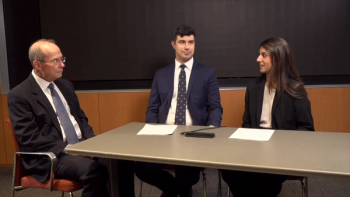
- Ophthalmology Times: August 2020
- Volume 45
- Issue 13
Artificial tears offer a path to contact lens comfort
Nanodrop technology improves lens comfort
This article was reviewed by Alanna D. Nattis, DO, FAAO
An artificial tear based on nanodroplet technology may improve content lens comfort in patients.
nanodroplet technology-based tear (Systane Complete, Alcon) significantly improved contact lens comfort in patients with
Related:
The rationale behind these drops is that the nanodroplet technology combines technology indicated for aqueous deficient
The formulation contains polyquaternium-1 is a preservative that is considered less irritating than benzalkonium chloride, according to Alanna D. Nattis, DO, FAAO, a cornea, cataract and refractive surgeon, and director of Clinical Research at SightMD, Babylon, New York.
The study
Nattis and colleagues undertook a study to test the effectiveness of this artificial tear for relieving lens discomfort in patients who wear daily disposable soft contact lenses.
The randomized investigator-masked clinical study ran for 2 weeks at 3 sites and included 46 symptomatic patients with
The inclusion criteria required the presence of substantial symptoms that were related to the contact lens wear.
Related:
All patients completed the Contact Lens Dry Eye Questionnaire-8 (CLDEQ-8) to determine the degree of eye discomfort that was related to the contact lenses. The patients were randomly assigned to treatment with artificial tears (n = 22) or no treatment (n = 24).
Patients in the active treatment group were instructed to instill 1 drop into the eye before wearing their contact lenses followed by 1 drop in each eye after removing the contact lenses.
The untreated patients were instructed not to use artificial tears during the study, Nattis explained.
The baseline signs and symptoms were compared with those at the end of the 2-week period.
The investigators measured the BCVA, the tear breakup time (TBUT), and the extent of corneal staining and performed Schirmer testing and evaluated meibum quality and expression.
Related:
The investigators also evaluated the patients based on the CLDEQ-8 questionnaire score, the standardized patient evaluation of eye dryness (SPEED) score, the contact lens log review completed daily by the treated patients, and the self-reporting by the treated patients regarding improvement.
Results
Nattis reported that 95% of the patients were compliant in the treatment group.
“Compared with the controls, significant improvements were seen in the treatment group in the end-of-day comfort (P = .045) at 2 weeks and comfortable contact lens wear time at 1 and 2 weeks (P = .006 and P = .02, respectively),” Nattis said.
No adverse events were reported.
Significant improvements also were seen in the questionnaire score (P = .006) and in the self-perceived eye comfort (P <.001) at 2 weeks.
Related:
The treated and untreated groups did not differ in the SPEED score, TBUT, corneal staining extent, or meibum expression.
Nattis pointed out that the results serve as an educational tool for patients in that the Systane Complete formulation may help increase contact lens tolerance and improve ocular health by potentially preventing contact lens–related complications and have implications for therapeutic contact lens wear.
--
Alanna D. Nattis, DO, FAAO
e:[email protected]
Nattis is a consultant and researcher for Alcon and Glaukos.
Articles in this issue
over 5 years ago
Experts review state of AMD in 2020over 5 years ago
An ophthalmologist faces down COVID-19over 5 years ago
Performing follow-up perfects surgical techniqueover 5 years ago
Working with optometrists is winning strategyover 5 years ago
Physicians’ treatment decisions are reinforced with good dataNewsletter
Don’t miss out—get Ophthalmology Times updates on the latest clinical advancements and expert interviews, straight to your inbox.




























